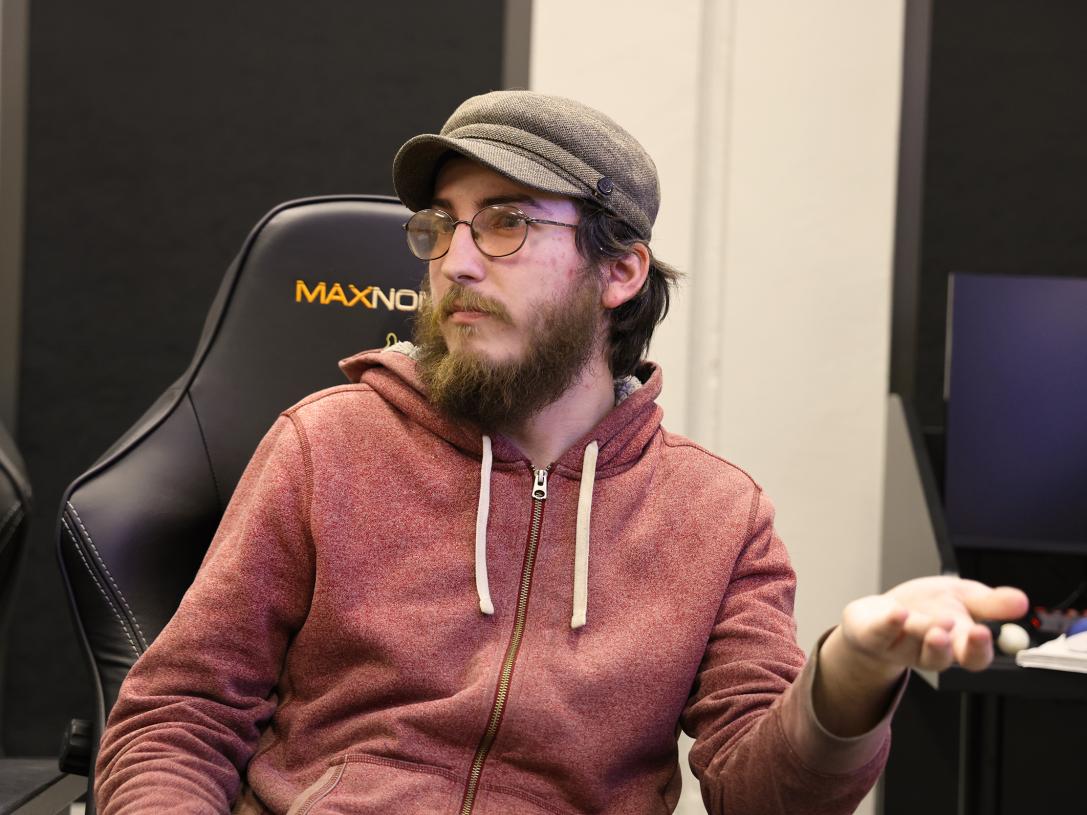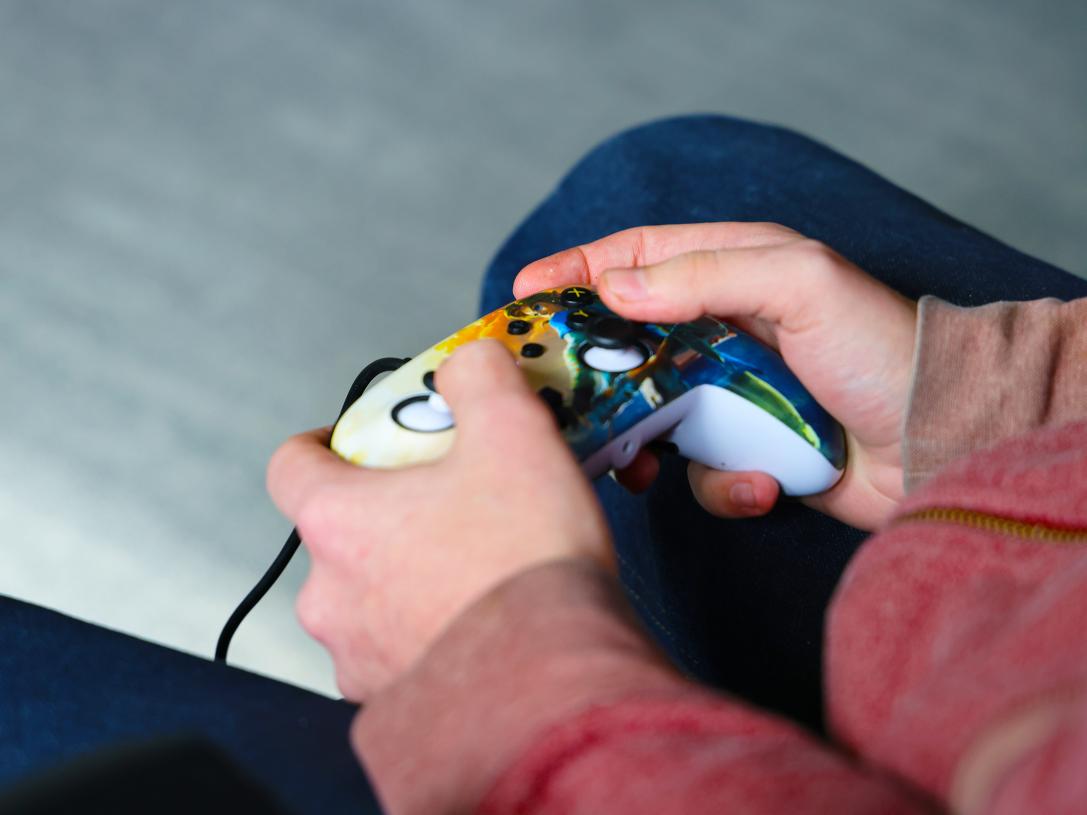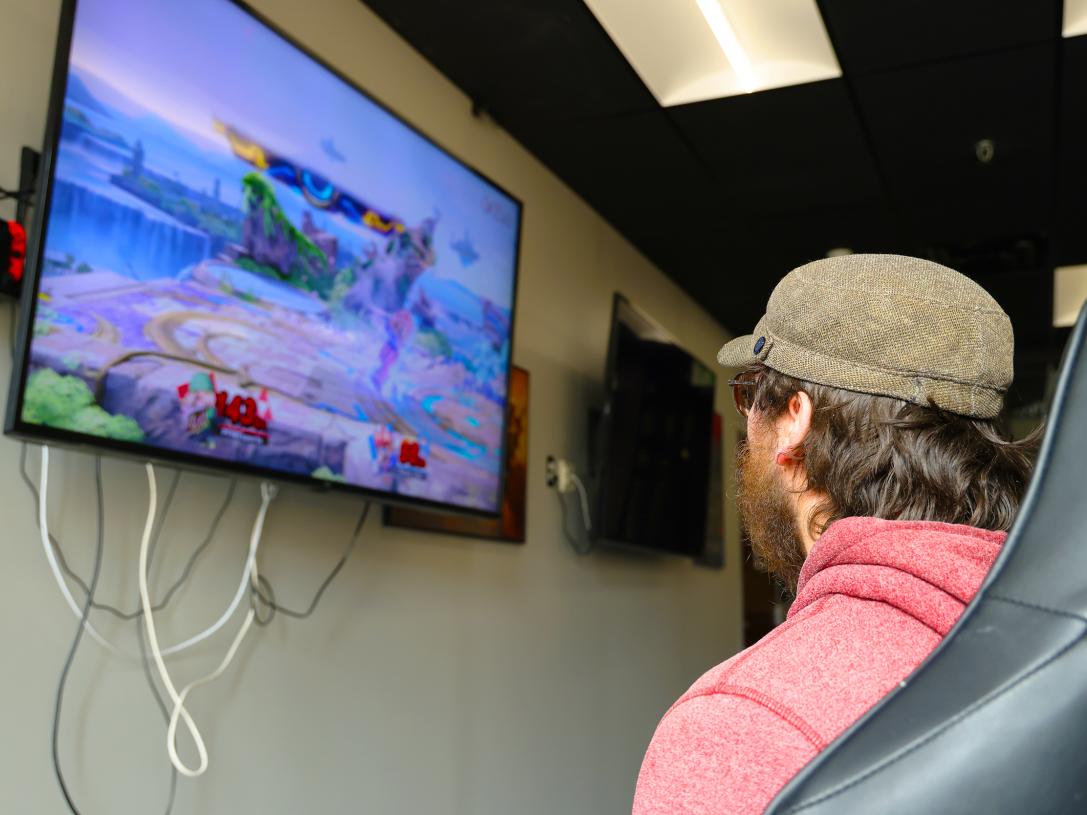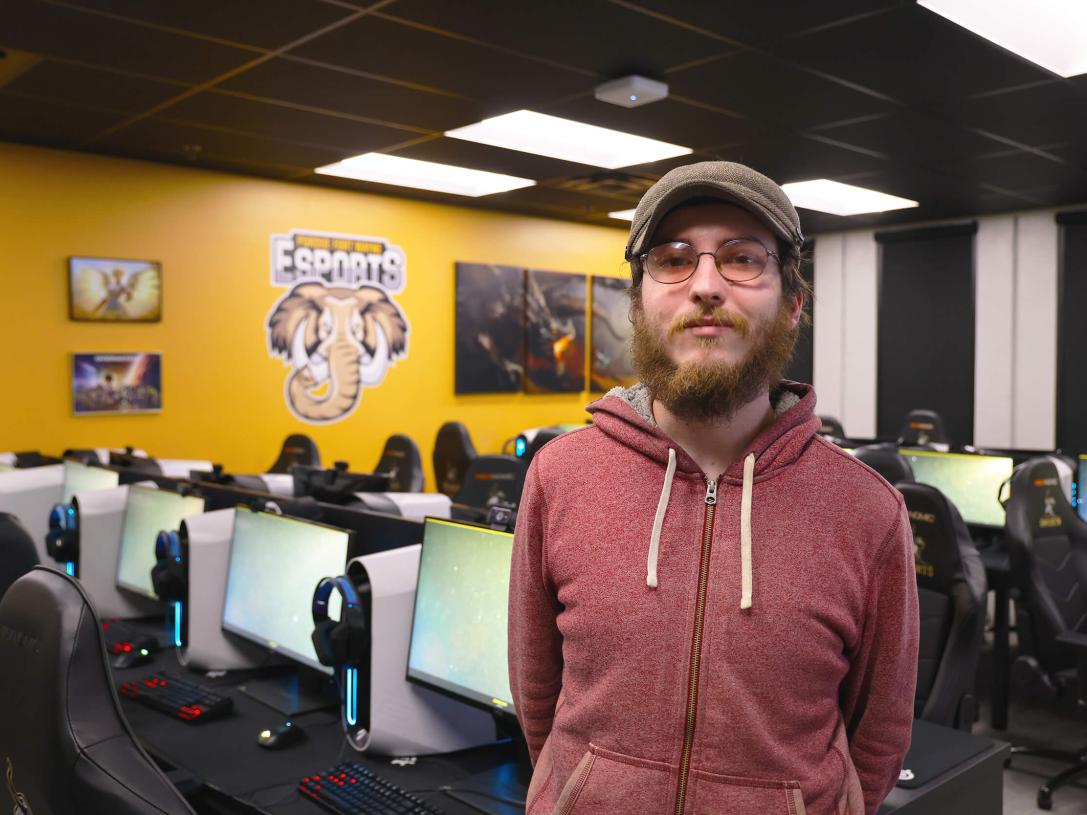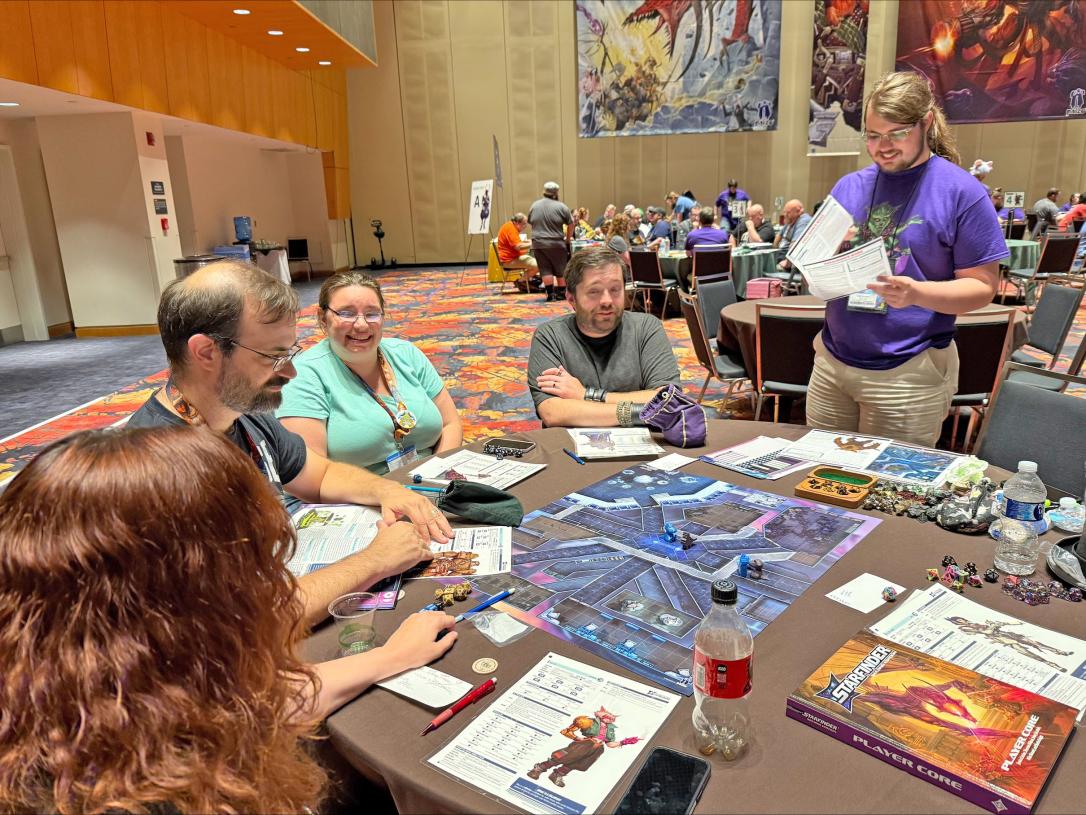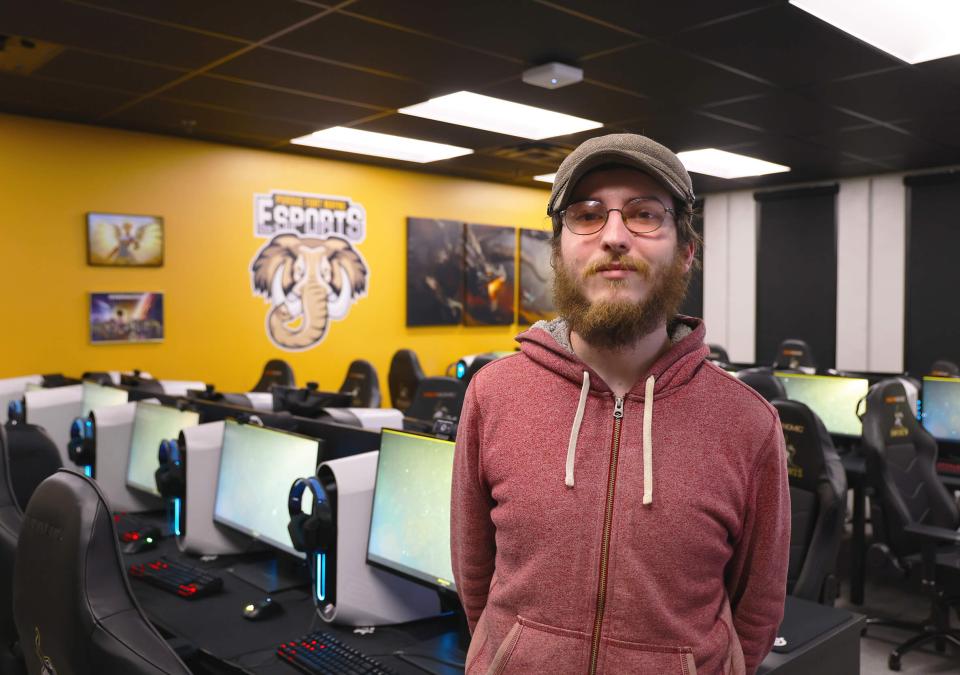
PFW Story
Esports player’s amazing ability is something to see
Several months after Nicholas Shatzer and Gabe Reed became acquainted playing in the Purdue University Fort Wayne esports lab, they arranged to meet for extra practice.
“I stopped by the clubhouse to check my mail, and on my way out ran into Nick making his way over to the esports lab with his walking stick,” Reed said. “It was the first time I realized that it wasn’t just that Nick’s vision was bad, but he’s basically blind.”
Though everyone recognizes Shatzer wears thick eyeglasses, rarely does anyone suspect he’s legally blind—especially if they’ve seen him play Super Smash Bros. A political science major with minors in applied ethics and actuarial science, the senior is a prodigy at the esports game. He only started playing for more than fun last semester, and this semester qualified to join the PFW varsity team.
Because the game plays online, Shatzer’s opponents have no idea he’s legally blind, but neither do most of his teammates.
“Eventually, it comes up in conversation months later, and we just move past it,” Shatzer said. “They either figure it out, or I have to tell them that’s why I’m not driving everywhere.”
Shatzer, who is 21, said 60–70% of people he meets don’t realize he’s blind. Though born with eye issues, he didn’t find out the extent until after passing his driver education learner’s permit test and then figuring an eye doctor appointment would be appropriate.
“It didn’t change my life much, it just made it easier to understand why I couldn’t do some things as well,” Shatzer said. “I didn’t know that there was anything wrong. I always just thought I had terrible reaction time for walking around or doing anything, so it was just compensating and always getting headaches by straining to always look around and do things as well as anyone else.”
As Shatzer describes, he can see motion with one eye and has tunnel vision in the other, comparable to forming a quarter-sized hole with the index finger and thumb and holding it at arm’s length.
So how can he effectively play a video game with all the moving parts, noises, and different colors? Shatzer excels at Super Smash Bros. because the action is confined to a part of the screen.
“If you are playing the game right, you don’t need the best vision because you don’t need to look at the whole screen all the time,” Shatzer said.
He’s also studied the game’s tendencies enough to understand the timing and strategy implicitly, anticipating opponents’ options and reactions. As team captain Jason Kakesa said, Shatzer is the classic character who’s always pushing up his glasses and saying, “Well, actually …”
“He’s always going on about frame data and what to do in every particular situation,” Kakesa said. “At first, it was incredibly annoying, but that’s what makes him good at the game, his ability to incorporate the notes he takes and data he studies into his gameplay. … Nick succeeds by understanding himself and his character, knowing what to do in any scenario at any given time.”
According to Joey Irvin, PFW esports lab administrator, Shatzer knows the little details better than almost anyone. Smash Bros. has over 80 characters with individual moves and different skills depending on the scenario.
“When we’re playing against each other, he’s always commenting on exactly why my attack just missed or explaining how he pulled off a combo he just hit,” Reed said. “There’s constantly something you can learn from him since he’s putting effort into learning more, which makes him a fantastic person to play with.”
Shatzer said he can use electronics up to four hours per day for homework or esports before getting a headache from compensating and concentrating. He also ran cross country at nearby Garrett High School.
“If people don’t know, they don’t know because I can just act like it’s fine,” Shatzer said. “If I couldn’t do as well as other people, oh, well, they still have fun because I’m bad at what we’re doing, and that just means they are winning.”
But why didn’t Shatzer join the team sooner? He intends to attend law school, and his course load was too busy for more than casual play. Because his credit hours are fewer this semester, he decided to be more social and wanted to find something he could do with everyone else where his blindness would not be as much of a factor.
Shatzer said he’s talked with many lawyers about his career possibilities, and most have encouraged him and helped him find resources. With assistance from the Disability Access Center, Shatzer has built a 3.8 grade point average and passed the Law School Admission Test. After a gap year, he plans on studying international law or earning a master’s degree in political science. His dream jobs are to work for the United Nations, the International Criminal Court, or working in the European Union.
“I like traveling and seeing different things, ironically,” Shatzer said with a grin.
Yes, he purposely tried for the pun.
“But it’s my job to make the joke,” he said.
